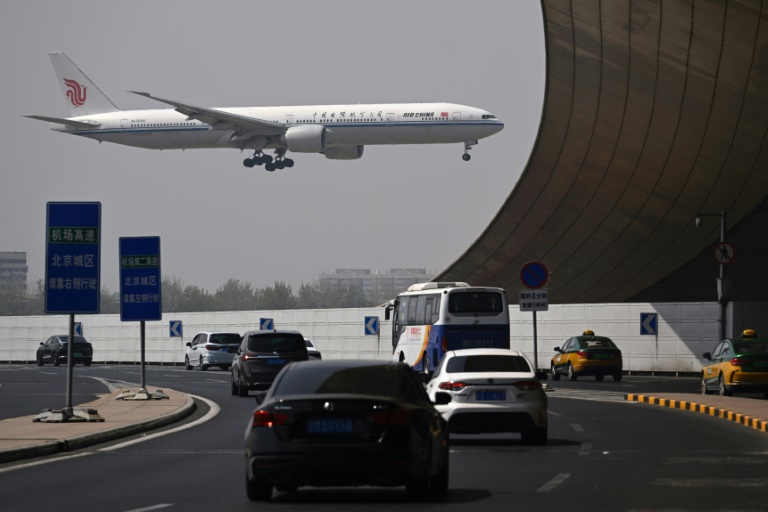Trump plays down tariff exemptions, says different classification to be applied to tech goods Published: 14 Apr. 2025, 09:07 U.S.
President Donald Trump speaks to the media on board Air Force One on the way to West Palm Beach, Florida, on April 13. [REUTERS/YONHAP] "Nobody is getting off the hook" from Donald Trump's tariffs, the U.S.

President emphasized in an online post on Sunday just days after announcing exceptions for electronic goods to the tech world's relief. Trump clarified on Sunday that his recent decision not to apply reciprocal tariffs on smartphones, semiconductors and other electronic products was not an exemption but a reclassification under a different tariff category. Related Article Tariff exemption on electronics will go away 'in a month or two': U.
S. Commerce Secretary Apple, Samsung avoid U.S.
tariff fallout but concerns over further action loom large U.S. tariff calculation leaves out Korea's $10.
7 billion trade surplus in services China hits back at Trump tariff hike, turmoil rings recession alarm “There was no tariff ‘exception’ announced on Friday,” Trump wrote on his official account on social media platform Truth Social on Sunday. “These products are subject to the existing 20 percent fentanyl tariffs, and they are just moving to a different tariff ‘bucket.’” “What has been exposed is that we need to make products in the United States, and that we will not be held hostage by other countries, especially hostile trading nations like China, which will do everything within its power to disrespect the American people,” wrote Trump.
“We also cannot let them continue to abuse us on Trade, like they have for decades, those days are over.” U.S.
Customs and Border Protection announced on Friday that smartphones, semiconductor manufacturing equipment and other electronic products would be excluded from reciprocal tariffs. As a result, electronics such as semiconductors will not be subject to the 125 percent reciprocal tariffs the U.S.
has imposed on China, nor will they face tariffs under the reciprocal measures applied to other countries, including Korea. However, a separate 20 percent tariff will still apply to Chinese products under an executive order targeting the opioid fentanyl, due to China’s alleged lack of cooperation in curbing its flow into the United States. The decision sparked speculation that Trump had effectively conceded in the ongoing tariff war with China, as China is a major manufacturer of the excluded electronic products.
Trump’s social media post appeared intended to counter that interpretation directly. White House officials and key figures from the Trump administration also appeared on television throughout the day to offer clarification. They explained that the decision was made to avoid overlapping tariffs, as product-specific tariffs on semiconductors and related items were already in the works.
U.S. President Donald Trump's post on social media Truth Social about his recent decision not to apply reciprocal tariffs on smartphones, semiconductors, and other electronic products [SCREEN CAPTURE] “So what [Trump is] doing is he's saying they're exempt from the reciprocal tariffs, but they're included in the semiconductor tariffs, which are coming in probably a month or two,” said Commerce Secretary Howard Lutnick in an interview with American broadcaster ABC.
“So, this is not like a permanent sort of exemption. He's just clarifying that these are not available to be negotiated away by countries.” Kevin Hassett, chairman of the National Economic Council (NEC), told CNN that products covered under Section 232 of the Trade Expansion Act “were always excluded” from reciprocal tariffs.
He confirmed that the United States intends to impose product-specific tariffs on smartphones and semiconductors based on national security grounds. The United States has already applied Section 232 tariffs — 25 percent — on steel, aluminum and automobiles. Nevertheless, most U.
S. media outlets predicted that even if the Trump administration imposes new product-specific tariffs on semiconductors and smartphones, those rates are unlikely to exceed the 145 percent tariff currently imposed on China, including the 20 percent fentanyl-related tariff. U.
S. President Donald Trump waves to the crowd as he attends UFC 314 at the Kaseya Center in Miami, Florida, on April 12. [AFP/YONHAP] Translated from the JoongAng Ilbo using generative AI and edited by Korea JoongAng Daily staff.
BY KANG TAE-HWA [ [email protected] ].
Trump plays down tariff exemptions, says different classification to be applied to tech goods

U.S. President Donald Trump speaks to the media on board Air Force One on the way to West Palm Beach, Florida, on April 13. [REUTERS/YONHAP] "Nobody is getting off the hook" from Donald Trump's tariffs, the U.S. President emphasized in an online post on Sunday just days after announcing exceptions for electronic goods to the tech world's relief. Trump clarified on Sunday that his recent decision not to apply reciprocal tariffs on smartphones, semiconductors and other electronic products was not an exemption but a reclassification under a different tariff category. Related ArticleTariff exemption on electronics will go away 'in a month or two': U.S. Commerce SecretaryApple, Samsung avoid U.S. tariff fallout but concerns over further action loom largeU.S. tariff calculation leaves out Korea's $10.7 billion trade surplus in servicesChina hits back at Trump tariff hike, turmoil rings recession alarm “There was no tariff ‘exception’ announced on Friday,” Trump wrote on his official account on social media platform Truth Social on Sunday. “These products are subject to the existing 20 percent fentanyl tariffs, and they are just moving to a different tariff ‘bucket.’” “What has been exposed is that we need to make products in the United States, and that we will not be held hostage by other countries, especially hostile trading nations like China, which will do everything within its power to disrespect the American people,” wrote Trump. “We also cannot let them continue to abuse us on Trade, like they have for decades, those days are over.” U.S. Customs and Border Protection announced on Friday that smartphones, semiconductor manufacturing equipment and other electronic products would be excluded from reciprocal tariffs. As a result, electronics such as semiconductors will not be subject to the 125 percent reciprocal tariffs the U.S. has imposed on China, nor will they face tariffs under the reciprocal measures applied to other countries, including Korea. However, a separate 20 percent tariff will still apply to Chinese products under an executive order targeting the opioid fentanyl, due to China’s alleged lack of cooperation in curbing its flow into the United States. The decision sparked speculation that Trump had effectively conceded in the ongoing tariff war with China, as China is a major manufacturer of the excluded electronic products. Trump’s social media post appeared intended to counter that interpretation directly. White House officials and key figures from the Trump administration also appeared on television throughout the day to offer clarification. They explained that the decision was made to avoid overlapping tariffs, as product-specific tariffs on semiconductors and related items were already in the works. U.S. President Donald Trump's post on social media Truth Social about his recent decision not to apply reciprocal tariffs on smartphones, semiconductors, and other electronic products [SCREEN CAPTURE] “So what [Trump is] doing is he's saying they're exempt from the reciprocal tariffs, but they're included in the semiconductor tariffs, which are coming in probably a month or two,” said Commerce Secretary Howard Lutnick in an interview with American broadcaster ABC. “So, this is not like a permanent sort of exemption. He's just clarifying that these are not available to be negotiated away by countries.” Kevin Hassett, chairman of the National Economic Council (NEC), told CNN that products covered under Section 232 of the Trade Expansion Act “were always excluded” from reciprocal tariffs. He confirmed that the United States intends to impose product-specific tariffs on smartphones and semiconductors based on national security grounds. The United States has already applied Section 232 tariffs — 25 percent — on steel, aluminum and automobiles. Nevertheless, most U.S. media outlets predicted that even if the Trump administration imposes new product-specific tariffs on semiconductors and smartphones, those rates are unlikely to exceed the 145 percent tariff currently imposed on China, including the 20 percent fentanyl-related tariff. U.S. President Donald Trump waves to the crowd as he attends UFC 314 at the Kaseya Center in Miami, Florida, on April 12. [AFP/YONHAP] Translated from the JoongAng Ilbo using generative AI and edited by Korea JoongAng Daily staff. BY KANG TAE-HWA [[email protected]]











